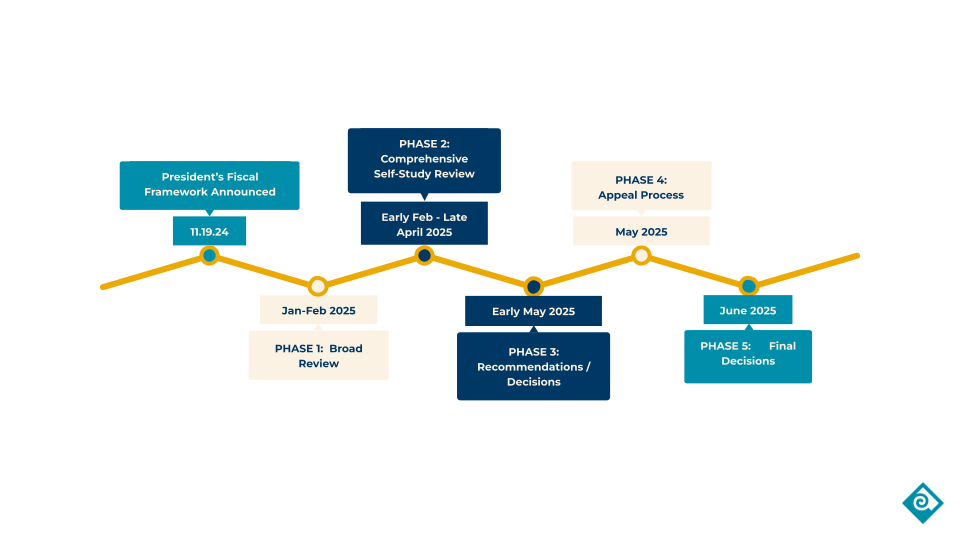Program and Discipline Fiscal Sustainability Review Process
Overview
The information here is to provide an overview of the Program/Discipline Fiscal Sustainability Review Process and to outline the process, the timeline, and provide a FAQs and a Question/Inquiry form for support and transparency.
Understanding that significant cost reductions to academic programs and disciplines (e.g., redesigns, mergers, closures, etc.) take time to implement, a Program/Discipline Financial Sustainability Review process will be enacted in winter and spring terms (2025) to result in savings in the second year of the upcoming biennium (FY26) and for the 2027-2029 biennium. In addition to this process, the college is already in a budget development process for the next biennium.
The process we will use to review program and discipline fiscal sustainability to identify cost savings is outlined below:
Broad Review of All Programs and Disciplines
Comprehensive Self-Study Review of Select Programs/Disciplines
Decision Making/Recommendations
Appeal Process
Final Decisions
Accountability Measures for Academic Affairs Leadership
In an effort to be more clear and transparent, the Academic Affairs Leadership is committed to the following accountability measures throughout this process:
fa regular fa file lines 1. Clear Documentation
- We will maintain detailed records throughout the process. This includes feedback collected, responses to feedback, scoring rubrics, and rationale for decisions made.
- We will update this webpage with additional information and documentation at each phase of the process.
fa solid fa pen to square 2. Regular Progress Updates
- We will schedule regular updates (e.g., at least one update per phase of the project) to share progress with faculty, staff, and others.
- We will use these updates to highlight milestones reached, challenges encountered, and next steps.
- Progress throughout the process will be tracked and recorded on this webpage and linked to the Fiscal Sustainability website.
fa regular fa comments 3. Feedback/Inquiry Mechanisms
- We will implement channels for faculty, staff, and managers to gather information and provide feedback on the process, both during and after the program self-studies.
- A Questions/Inquiry form will be provided with each communication. We will provide a response directly to each submitter if an email is provided with the question.
- Time with leaders will be offered to impacted programs/disciplines at the end of the comprehensive deep review and post-appeal, and by request at any phase/time of the process.
Updates
The first phase of the review process, the Broad Review of programs/disciplines, is now complete.
The results of the Broad review indicate that our programs/disciplines fall into these three categories:
- Category #1 – Programs/disciplines working toward standard cost-saving efforts: These programs/disciplines showed no major concerns, but we’ll continue working on cost savings across all programs.
- Category #2 – Programs with specific recommendations to implement: These programs have minor questions or recommendations for improvement, and we’ll ask them to develop a plan to address these by the end of fall term 2025.
- Category #3 – Programs moving to a self-study: These programs have more significant concerns or multiple questions and will be asked to conduct a comprehensive self-study to help us understand the data better and explore potential solutions. The self-study templates will be provided and are due by March 21, 2025.
A breakdown of the assigned categories is as follows:
- 67% of programs showed no major concerns (Category #1).
- 17% of programs had specific recommendations or questions to be answered (Category #2).
- 16% of programs need to complete a self-study (Category #3).
Programs in Category #3 will be working on their comprehensive self-study which is due April 8, 2025.
Summary of Program/Discipline Cost Reduction Phases and Timeline
Phase 1
Broad Review (January – February 2025)
Key Actions:
- Compile data for the initial broad review and communicate the process to Academic Affairs program/discipline employees.
- Prepare evaluation materials, including instructions and training resources for Pathway and Program Deans.
- Conduct a norming session with Pathway and Program Dean evaluators to align understanding of evaluation criteria.
- Evaluate data, compiling scored rubrics and qualitative feedback.
- Hold Pathway-specific meetings with evaluators to identify programs for comprehensive in-depth review.
- Document final decisions and rationales regarding programs to be reviewed further.
- Notify all programs of the outcomes of the broad review: (1) identified for self-study, and (2) not identified, but encouraged to identify cost savings.
Phase 2
Comprehensive Self-Study Review (late February – early April 2025)
Key Actions:
- Develop training and support materials for programs undergoing self-studies.
- Provide guidance on self-study expectations, including scheduled help sessions.
- Review self-studies, scoring them according to established evaluation framework.
- Hold Pathway-specific meetings with evaluators to discuss evaluations and identify program/discipline-specific recommendations.
- Document decisions and rationale following the review meetings, compiling recommendations for the President.
Phase 3
Decision Making/Recommendations (early May 2025)
Key Actions:
- Finalize recommendations based on comprehensive self-study reviews and present them to the President.
- Prepare communications and notifications regarding decisions, ensuring stakeholders are informed of the outcomes.
- Notify programs of decisions made.
Phase 4
Appeal Process (May 2025)
Key Actions:
- Offer help sessions and meetings for programs/disciplines to discuss decisions and potential appeals.
- Facilitate the appeals process, collecting submissions and sharing them with the Cabinet for review.
- Cabinet reviews appeals.
Phase 5
Final Decisions (June 2025)
Key Actions:
- Cabinet finalizes decisions regarding appeals.
- Prepare communication materials to share outcomes with the individual programs/disciplines, PCC community, and the Board.
- Notify programs of final decisions.
- Conduct follow-up meetings with affected faculty/staff to discuss outcomes and next steps (including teach out plans, as necessary).
- Compile results of the entire process, including documentation of timelines and rationales for decisions.
FAQs
- FAQs for the Program/Discipline Fiscal Sustainability Process
- Question/Inquiry Form for the Program/Discipline Fiscal Sustainability Process
- If you have a question or inquiry about the process, please fill out the form and we will do our best to provide a response within 48-72 business hours.


